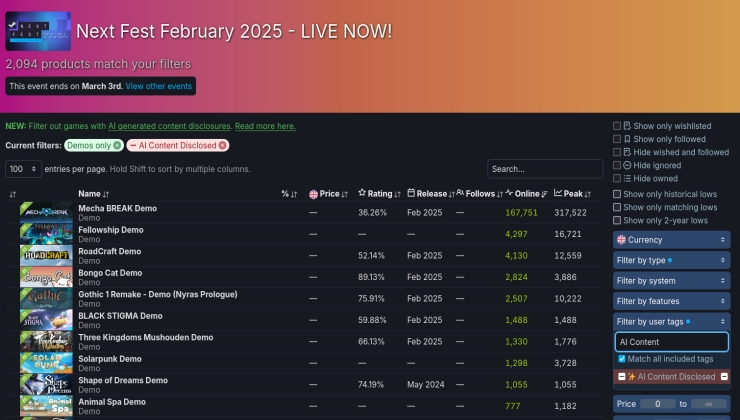The Khronos Group have announced the release of the Vulkan 1.3.274 API, which brings with it the finalized extensions for encoding and decoding of video streams using a variety of video coding standards.
It was back in April 2021 that the provisional extensions were released as "Vulkan Video", and later in December 2022 with Vulkan 1.3.238 they finalized the decode extensions for H.264 and H.265. Now with Vulkan 1.3.274 the counterpart extensions to enable encoding H.264 and H.265 are available.
"Leveraging the Vulkan framework, they provide a standardized, seamless, low-overhead, and highly controllable way to produce H.264 and H.265 video via hardware accelerators, with applications ranging from real-time, low-latency streaming to offline server-scale transcoding."
Details about the Vulkan Video API extensions at the below links::
- VK_KHR_video_queue
- VK_KHR_video_decode_queue
- VK_KHR_video_decode_h264
- VK_KHR_video_decode_h265
- VK_KHR_video_encode_queue
- VK_KHR_video_encode_h264
- VK_KHR_video_encode_h265
- VK_KHR_video_maintenance1
NVIDIA already have Beta driver 535.43.22 out with expanded support, while work on AMD / Intel continues.
Read the full blog post here. The ongoing status of Vulkan Video can be seen on GitHub.
Nice to see the modern Vulkan API continue to evolve for the needs of modern developers across all industries. Hopefully this will improve video across the Linux desktop and gaming too.
Or, worse, if one needs to worry about MPEG licenses if one uses unrelated parts of Vulkan...
I just saw this toot, and now I'm wondering if one really needs to worry about licensing if one uses those APIs...Kind of an overly alarmist take. The API being able to do it, doesn't mean you have to use it. You're not subject to patents you don't use - if they even cover this.
Or, worse, if one needs to worry about MPEG licenses if one uses unrelated parts of Vulkan...
I just saw [this toot](https://mastodon.gamedev.place/@sos/111612328543912847), and now I'm wondering if one really needs to worry about licensing if one uses those APIs...Kind of an overly alarmist take. The API being able to do it, doesn't mean you have to use it. You're not subject to patents you don't use - if they even cover this.
Or, worse, if one needs to worry about MPEG licenses if one uses unrelated parts of Vulkan...
exactly and one cannot patent a function call. In any case nVIDIA, Intel and AMD have all licensed the MPEG patents to be able to implement the hardware decoder (since the patent covers the algorithm) so this is all covered.
Iirc the hardware and drivers don't need a license, only the software that makes the codecs available to end users. At some point Fedora even removed some Mesa features related to those video codecs because of that: https://lists.fedoraproject.org/archives/list/[email protected]/thread/PYUYUCM3RGTTN4Q3QZIB4VUQFI77GE5X/I just saw [this toot](https://mastodon.gamedev.place/@sos/111612328543912847), and now I'm wondering if one really needs to worry about licensing if one uses those APIs...Kind of an overly alarmist take. The API being able to do it, doesn't mean you have to use it. You're not subject to patents you don't use - if they even cover this.
Or, worse, if one needs to worry about MPEG licenses if one uses unrelated parts of Vulkan...
exactly and one cannot patent a function call. In any case nVIDIA, Intel and AMD have all licensed the MPEG patents to be able to implement the hardware decoder (since the patent covers the algorithm) so this is all covered.

and using ffmpeg-vulkan branch (https://github.com/cyanreg/FFmpeg/tree/vulkan) on encoders appear h264_vulkan

however when try compile show error related to new extensions

Iirc the hardware and drivers don't need a license, only the software that makes the codecs available to end users. At some point Fedora even removed some Mesa features related to those video codecs because of that: https://lists.fedoraproject.org/archives/list/[email protected]/thread/PYUYUCM3RGTTN4Q3QZIB4VUQFI77GE5X/I just saw [this toot](https://mastodon.gamedev.place/@sos/111612328543912847), and now I'm wondering if one really needs to worry about licensing if one uses those APIs...Kind of an overly alarmist take. The API being able to do it, doesn't mean you have to use it. You're not subject to patents you don't use - if they even cover this.
Or, worse, if one needs to worry about MPEG licenses if one uses unrelated parts of Vulkan...
exactly and one cannot patent a function call. In any case nVIDIA, Intel and AMD have all licensed the MPEG patents to be able to implement the hardware decoder (since the patent covers the algorithm) so this is all covered.
I see a lot of hand-waving without any evidence or proofs and just guesswork on that thread to be fair. It's the compression/decompression algorithm that is patented and if the GPU have hardware acceleration of it then the GPU manufacturer must be a patent license or nVIDIA, AMD and Intel would expose all of they customers to be sued for infringement (including themselves). They are however most likely licensed to cover only "personal and non-commercial use" since they really want to extort a license from commercial content creators as well (that is where the big license money is).
But that is no different from any other software, aka it doesn't matter if you use macOS, Windows, Adobe or whatever. If you are a content studio compressing H.264 content then you need a license regardless of what hw or sw you use.
edit: In any case I'm just happy to be in the EU since software patents are not enforceable here.
Last edited by F.Ultra on 21 Dec 2023 at 2:27 pm UTC
They are however most likely licensed to cover only "personal and non-commercial use" since they really want to extort a license from commercial content creators as well (that is where the big license money is).I seem to remember MPEG-LA allowing all web content (even commercial?) to use H.264 without a license. From [that time Wikipedia voted on whether to use H.264](https://commons.wikimedia.org/wiki/Commons:Requests_for_comment/MP4_Video):
But that is no different from any other software, aka it doesn't matter if you use macOS, Windows, Adobe or whatever. If you are a content studio compressing H.264 content then you need a license regardless of what hw or sw you use.
Commercial use of MP4 videos contributed to Wikimedia sites with a CC-BY-SA Creative Commons license appears to be authorized under the terms of MPEG-LA’s royalty-free Internet Broadcast sublicense, as outlined below. Since using a proprietary format would be a departure from our current practice of only using open formats on our sites, WMF has opened this Request for Comments to seek community guidance.So it's something that is already implicitly granted by the H.264 patent pool, so NVIDIA/AMD/Intel wouldn't even need to provide a license. The link to this sublicense is dead now. I wonder what exactly the terms were. Wikimedia was also apparently offered a special deal:
Why is this happening? WMF was offered an MP4 license so attractive WMF had to consider it. The deal was so unprecedented, part of it included non-disclosure of the exceptionally beneficial WMF terms so as not to alienate its other customers (who pay through the nose for their own MP4 licenses). Commercial enterprises don't give anything away for free because they are nice, they do so only when it will lead to increased profits in the end.To add to this, Google Chrome and recently Firefox added support for hardware decoders for H.265. Firefox in particular should not have been able to do this unless making use of hardware decoders does not require them to have a license.
I love talking about video codec patents. I always end up more confused than when I started.
Last edited by pleasereadthemanual on 21 Dec 2023 at 2:38 pm UTC
They are however most likely licensed to cover only "personal and non-commercial use" since they really want to extort a license from commercial content creators as well (that is where the big license money is).I seem to remember MPEG-LA allowing all web content (even commercial?) to use H.264 without a license. From [that time Wikipedia voted on whether to use H.264](https://commons.wikimedia.org/wiki/Commons:Requests_for_comment/MP4_Video):
But that is no different from any other software, aka it doesn't matter if you use macOS, Windows, Adobe or whatever. If you are a content studio compressing H.264 content then you need a license regardless of what hw or sw you use.
Commercial use of MP4 videos contributed to Wikimedia sites with a CC-BY-SA Creative Commons license appears to be authorized under the terms of MPEG-LA’s royalty-free Internet Broadcast sublicense, as outlined below. Since using a proprietary format would be a departure from our current practice of only using open formats on our sites, WMF has opened this Request for Comments to seek community guidance.So it's something that is already implicitly granted by the H.264 patent pool, so NVIDIA/AMD/Intel wouldn't even need to provide a license. The link to this sublicense is dead now. I wonder what exactly the terms were. Wikimedia was also apparently offered a special deal:
Why is this happening? WMF was offered an MP4 license so attractive WMF had to consider it. The deal was so unprecedented, part of it included non-disclosure of the exceptionally beneficial WMF terms so as not to alienate its other customers (who pay through the nose for their own MP4 licenses). Commercial enterprises don't give anything away for free because they are nice, they do so only when it will lead to increased profits in the end.To add to this, Google Chrome and recently Firefox added support for hardware decoders for H.265. Firefox in particular should not have been able to do this unless making use of hardware decoders does not require them to have a license.
I love talking about video codec patents. I always end up more confused than when I started.
Ok, but that talks specifically about non-comercial use so I guess that commercial use which I wrote about still requires a license? And I don't think that none of this means that there is no need for a patent license for the hardware since a GPU is a commercial thing and also it is the ago itself while the content is the result of the algo so to speak.
E.g MP3 there you had to have a license to be able to compress and decompress the data since both use the MP3 algo but just having a MP3 or distributing it doesn't involve the algo so that is not something that they could prohibit you from doing with any license.
But yes I'm with you that this is all hairy and I for one would gladly see software patents go, they only stifle innovation in a field that is moving way to fast for something to be locked away for 25 years.
edit: Wikipedia:
On September 29, 2014, MPEG LA announced their HEVC license which covers the essential patents from 23 companies.[48] The first 100,000 "devices" (which includes software implementations) are royalty free, and after that the fee is $0.20 per device up to an annual cap of $25 million.
...
On December 18, 2015, HEVC Advance announced changes in the royalty rates. The changes include a reduction in the maximum royalty rate for Region 1 countries to US$2.03 per device, the creation of annual royalty caps, and a waiving of royalties on content that is free to end users. The annual royalty caps for a company is US$40 million for devices, US$5 million for content, and US$2 million for optional features.
...
On November 22, 2016, HEVC Advance announced a major initiative, revising their policy to allow software implementations of HEVC to be distributed directly to consumer mobile devices and personal computers royalty free, without requiring a patent license.
So as of 2016 they see sw implementations is license-free, that to me tells that they still require a license for the hw implementation. So Firefox et al can use the hw implementation since AMD have licensed it and Firefox is not creating content, they are only using the API:s provided by e.g AMD. You for non-commercial don't have to pay a license but a commercial entity probably have to.
This is always so damn silly. The same happens in the financial industry where I work. Over here in Europe the EU have standardised to use ISIN-codes as the universal identifier for financial instruments and they are completely free to use, but in the US they use CUSIP-codes instead (and they create the ISIN by prefixing the CUSIP with "US" and then suffixing a check-digit at the end) which requires a license in every single step, aka if you issue a instrument you have to pay a license, if you distribute that CUSIP/ISIN to some one else then they also have to pay a license and if they happen to whisper that code to any one then they are also required to pay a license and so on and on.
Last edited by F.Ultra on 24 Dec 2023 at 7:28 am UTC
Ok, but that talks specifically about non-comercial use so I guess that commercial use which I wrote about still requires a license?
I was quite confused too when I saw that "commercial use" was okay according to that comment on Wikipedia. I think this is covered later on in your comment.
And I don't think that none of this means that there is no need for a patent license for the hardware since a GPU is a commercial thing and also it is the ago itself while the content is the result of the algo so to speak.That sounds correct to me. A GPU doesn't only decode/encode patent-encumbered media on the web. I was more thinking that, from the perspective of Wikipedia which only operates on the web, they should already be fine to decode/encode without needing to even worry about NVIDIA/AMD/Intel paying for a license? Something like that. It's not really relevant to the Vulkan situation.
But yes I'm with you that this is all hairy and I for one would gladly see software patents go, they only stifle innovation in a field that is moving way to fast for something to be locked away for 25 years.I agree on all counts.
5 more years...then H.264 will be free of patents, and most of us can forget all about HEVC and VVC. Maybe AV1 will survive the Sisvel patent pool...
You know, I only know about any of this stuff because I was wondering why importing video into DaVinci Resolve didn't work? Because it doesn't have any licensed decoders for H.264 or AAC on Linux...
So as of 2016 they see sw implementations is license-free, that to me tells that they still require a license for the hw implementation. So Firefox et al can use the hw implementation since AMD have licensed it and Firefox is not creating content, they are only using the API:s provided by e.g AMD. You for non-commercial don't have to pay a license but a commercial entity probably have to.Well, there are two patent pools for HEVC with their own terms and you need to get a license from both. Does the MPEG-LA pool also allow sw implementations without a license? It sounds like they only allow that for the first 100,000, which free software like Firefox would not be able to satisfy because...it's free software.
But since Firefox doesn't want to ship a sw implementation anyway (and they will never be able to without Cisco stepping in again), they can just make use of AMD's hardware license without concern. And as you say, the commercial entity using Firefox is the one that needs to pay for the license(s).
Apparently Velos Media is a third patent pool for HEVC?! Please tell me I'm reading that wrong.
This is always so damn silly. The same happens in the financial industry where I work. Over here in Europe the EU have standardised to use ISIN-codes as the universal identifier for financial instruments and they are completely free to use, but in the US they use CUSIP-codes instead (and they create the ISIN by prefixing the CUSIP with "US" and then suffixing a check-digit at the end) which requires a license in every single step, aka if you issue a instrument you have to pay a license, if you distribute that CUSIP/ISIN to some one else then they also have to pay a license and if they happen to whisper that code to any one then they are also required to pay a license and so on and on.That does sound pretty damn silly. Licenses...
And on a completely unrelated note: while I might have Daria as my profile picture, Buffy is still my favorite TV show.









 How to set, change and reset your SteamOS / Steam Deck desktop sudo password
How to set, change and reset your SteamOS / Steam Deck desktop sudo password How to set up Decky Loader on Steam Deck / SteamOS for easy plugins
How to set up Decky Loader on Steam Deck / SteamOS for easy plugins
See more from me